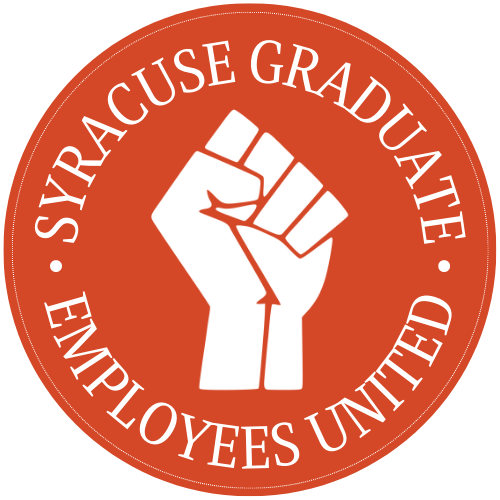Resources for International Graduate Students
As international graduate student workers, we face unique challenges in Higher Education. We are invested in making Higher Education institutions a better place to teach and conduct research for all. Below, you’ll find a short FAQ to help dispel any myths about international students’ right to organize!
Could joining the union risk my immigration status?
No! You’re not alone in this fear. Many of us from countries without strong labor protections initially shared similar concerns. However, all student employees within the US, regardless of their citizenship, visa, or immigration status, have federally-protected rights to engage in activity with their co-workers concerning their working conditions and form a union under the National Labor Relations Act (NLRA).
This means you can:
Talk about your working conditions with your coworkers, the public, the media, or a union.
Take action with one or more of your co-workers to improve your working conditions.
Join a union or help a union become the representative of the employees at your place of work and help a union bargain for a contract to set your wages and other conditions of work.
Will my union membership affect my student visa? Can it affect future visas?
No! It is your right to belong to a union; union membership cannot affect your current visa or visa application. The U.S. Citizenship and Immigration Services (USCIS) cannot ask you questions about your union membership or participation in lawful union activity. In addition, the Department of Homeland Security (DHS) recognized the importance of enforcing labor laws and signed an agreement with the Department of Labor (DOL) and other federal labor agencies, including the National Labor Relations Board (NLRB)—the agency that enforces the NLRA—to that effect. This agreement, also known as a memorandum of understanding (MOU), is meant to ensure that immigration enforcement does not interfere with the exercising of labor rights.
The National Labor Relations Board (NLRB) has widely recognized that the Act does not differentiate between citizens and non-citizens. Its statutory protections are equal to all covered workers, regardless of their status as immigrants to this country.
What are my rights during union organizing?
Under the NLRA, you have the right to organize a union to negotiate with your employer over your terms and conditions of employment. This means you can distribute union literature, wear union buttons, t-shirts, or other insignia, solicit coworkers to sign union authorization cards, and discuss the union with coworkers.
You cannot be fired, disciplined, demoted, or penalized in any way for engaging in these activities.
Your employer cannot prohibit you from talking about or soliciting for a union or from distributing union literature.
Could Syracuse University retaliate against you if you choose to sign a card or join the union organizing campaign?
No! It is illegal for the university to retaliate against its workers for unionizing, AND it is illegal to use your visa or immigration status against you. However, SU could decide to risk taking an illegal action. But that is a danger we are already exposed to without a union. Universities regularly take advantage of our legal vulnerability, and workers are often punished for speaking up even when such retaliation is illegal. This is why at the end of the day, we need real legal protection under a Graduate Student Employees Union.
What will we do if Syracuse University decides to risk taking an illegal action?
We will contact the National Labor Relations Board (NLRB) to file a charge. The NLRB will investigate the charge, regardless of your citizenship, visa, or immigration status. Thus, the NLRB will not ask about your immigration status or the immigration status of others during their investigation or litigation to prove any violation of the NLRA.
The NLRB may take legal action against SU if the evidence shows that the university is unlawfully using your immigration status to threaten or retaliate against you because you exercised your rights under the NLRA.
The NLRB may also work with other agencies, like USCIS, to ensure that immigration laws are not being used to threaten or retaliate against workers for exercising their rights under the NLRA.
If you were fired because you exercised your rights under the NLRA, the NLRB will work to get your job back and to get you paid for your lost wages.
Immigration status is not relevant to whether there has been a violation of the NLRA. The information obtained during NLRB investigations is protected.
Three recent memoranda issued by the DHS and the NLRB provide the ability for the NLRB to seek protections for non-immigrant workers, including considering whether you could be eligible for deferred action and may work with immigration agencies to try and obtain this type of relief while taking steps to restore any harm to a person’s ability to work and study under a visa. The three memoranda are: (1) Worksite Enforcement: The Strategy to Protect the American Labor Market, the Conditions of the American Worksite, and the Dignity of the Individual, DHS (Oct. 12, 2021); (2) GC Memorandum 22-01, Ensuring Rights and Remedies for Immigrant Workers under the NLRA (Nov. 8, 2021); and (3) OM Memorandum 22-09 Ensuring Safe and Dignified Access for Immigrant Workers to NLRB Processes (May 2, 2022).
What is the National Labor Relations Board?
The National Labor Relations Board (NLRB) is an independent federal agency of the United States Government. The NLRB has two functions:
Enforcing laws to ensure that workers may freely exercise their rights under the NLRA without any interference from employers or unions.
Holding secret ballot elections where workers can choose whether they wish to have a union represent them.


